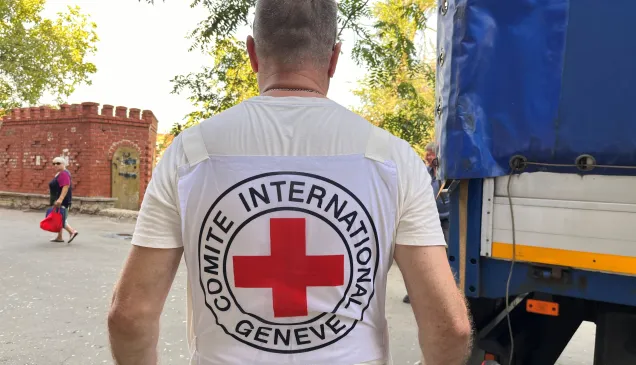Day of Persons with Disabilities: COVID-19 an extra hurdle for those with disabilities

What does the risk of COVID-19 mean for people with disabilities? First, the disease brings with it the extra risk that a person with disabilities could be pushed even farther to the periphery of their communities. Societies already affected by conflict and violence will face the greatest obstacles to prioritizing the inclusion of persons with disabilities.
December 3 is recognized as the International Day of Persons with Disabilities. The important day in 2020 is a moment to remember the impact that COVID-19 has had on people in need.
Our program in Afghanistan, like many countries around the world, had to suspend service earlier this year due to COVID-19. However, Alberto Cairo, the head of the ICRC’s orthopaedic programme in Kabul, said that things are slowly picking up again, though a quarter of ICRC’s services remain suspended, showing the challenges amid COVID-19 to help those in need.
We regularly meet people whose drive and resilience inspire us. On this International Day of People with Disability, we bring you the story of two of such individuals.
Despite losing his leg to a landmine, Yagana has continued to work hard to support his family.#IDPWD2020 pic.twitter.com/gmcRTcj16H— ICRC in Nigeria (@ICRC_Nigeria) December 3, 2020
Of the tens of millions of people with physical disabilities who require a mobility device worldwide, only 10% on average have access to the physical rehabilitation services that would lead to social and economic inclusion.
That’s why we at the ICRC say that disability inclusion efforts must remain a priority. Global data show that employment rates are lower for disabled men (53%) and women (20%) than for non-disabled men (65%) and women (30%) [1].
The ICRC is working to help people with disabilities realize their full potential via its Career Development Programme (CDP), developed in partnership with Adecco Group Foundation.
This career programme aims to create meaningful, lasting change so that persons with physical disabilities are included in the labour market. ICRC staff are working in rehabilitation centres are trained so they can better help persons with physical disabilities pursue career opportunities that will help them to realise their full potential in society.
Mr. Emhemmed was shot in the leg during the conflict in Libya.
This is the difference a prosthesis made. #IDPWD2020 pic.twitter.com/YTyf2zVKxj— ICRC (@ICRC) December 3, 2020
“What is necessary to stop this temporary barrier from becoming a long-term regression is the commitment from all sections of society – governments, employers, educational institutions, healthcare providers, among others – in countries all over the world to continue prioritizing disability inclusion efforts,” said Jess Markt, ICRC’s sport and inclusion advisor.
The ICRC is supporting 173 physical rehabilitation centres in 46 countries. And even amid the COVID-19 pandemic, between January and November this year, more than 235,000 people received services at ICRC-assisted centres. We helped thousands of people learn to operate and live with new prosthetic arms and legs, and we also gave away more than 5,000 wheelchairs and 30,000 crutches, all with the aim of allowing people to more easily integrate with the rest of society.



